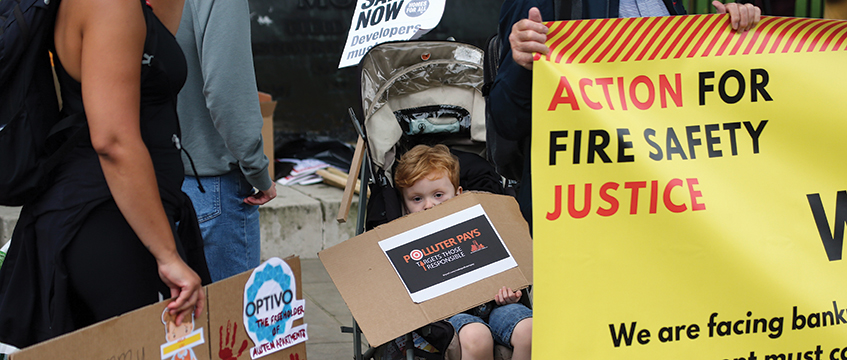Ukraine’s real estate markets have taken a beating. “The year 2009 was tragic, desperately bad, absolute stagnation,” says Nick Cotton, DTZ managing director, based in Kiev. “Developers ran out of finance, banks would simply not discuss new finance and failed to take action on non-performing loans.”
He is disappointed that banks have been unable to put pressure on developers to trade. “That would have been an opportunity to find a yield benchmark. As it was, we had vulture funds wanting to buy at 20% yields but owners were saying no, we want to sell at 12%,” says Cotton.
However, he has seen a glimmer of hope for the future. “Late in 2009 and over the start of this year, some of the banks were prepared to restructure finance, to lend very selectively on trading investments, and to discuss financing stalled projects, sooner than we had anticipated.”
DTZ has also experienced a significant upswing over the past few months in valuation instructions from banks, although Cotton says it is unclear whether these instructions are for third-party exit agreements, or to take equity, or to foreclose. “This upswing could mark a willingness to accept that mistakes have been made and to move on,” he says.
Other signs of market movement include a sale of retail and entertainment development project Sky Mall in Kiev. Ukraine’s largest commercial property developer, Panorama Group, just sold a 50% share in Sky Mall to the Oledo Group, which will enable the developer to finish construction. Details of the sale were not disclosed but the 88,000 m2 scheme is worth around $150m (€123m). The proceeds will fund completion of the project, set for later this year.
Terry Pickard, group chairman of property consultancy NAI Pickard, is confident of more market movement. He says: “Banks have been picking up bad debts but haven’t started clearing them out yet. They hope that people will start paying off debt as the economy improves. But some people can’t afford this and banks will have to take losses.
“Usually all the banks do this at the same time and there will be some very cheap assets on the market. There are some UK parties, some big private industrial Russian groups, plus some Kazakhstani and Arab funds that still have money to spend and they are sharpening their knives in preparation,” says Pickard.
To take advantage of this interest, Pickard has put together the $100m Primeros Property Fund, an unleveraged opportunistic, Jersey-registered vehicle. He says yields in Ukraine can be up to 20% and assets could be bought for around 50% of their 2008 prices, adding that such assets could yield triple the equity invested in them within three years.
“I don’t think Ukraine is particularly risky, if you invest sensibly. There were some silly people who overpaid for property in 2008 when rents were unsustainably high. Sometimes buyers were hiring their own valuer on deals and banks accepted these valuations,” says Pickard.
According to Jones Lang LaSalle, unlisted Ukrainian companies have been the key buyers in the market, picking up high-quality assets in good locations. Nevertheless, development projects are shunned, and despite sharp price corrections, there is little prime product suitable for purchase.
Persistent problems in the debt markets are keeping lot sizes of standing investments low, and this will continue. Kiev yields are among the highest in Europe, at around 15% for shopping centres and offices, and 16% for warehousing.
Owing to the financial meltdown, most office projects in the capital Kiev were suspended, leading to a vastly reduced supply of new space coming to the market last year – down 66% year on year. JLL says that net absorption of offices in the last quarter of 2009 was 59,000 m2, which shows that occupier demand is improving. Until 2008, rents had generally been set in dollars but paid in the local currency (Ukrainian hryvnya, HRN). But when the exchange rate rose adversely by 60%, tenants started demanding rent reductions and their rent to be fixed in HRN only.
Landlords were forced to let space at drastically reduced rates from the primary lease rate, as vacancy rates had peaked from 2% to 15% in some areas of the city. Towards the end of 2009, the leasing market stabilised, although at a low level.
Shortage of prime office space
Kiev has only 253 m2 of A and B class offices per 1,000 people, compared with 1,450 m2 of the same class of space in Warsaw. Out of 300,000 m2 of offices planned last year, only 156,000 m2 was actually commissioned, says NAI Pickard.
Because of this very low level of m2 per inhabitant compared with other European centres, there is a strong argument that as the country’s economy starts to grow again, vacant space will be quickly absorbed and rents will start to climb again. Pickard says that this will happen in the second half of this year while others, who are more conservative, say that it will happen in the first quarter of 2011.
DTZ has recently concluded a clutch of lettings. Acting for KPMG, it secured a new lease for 2,500 m2 in the Baroque Centre at 11 Mikhailivska Street; and also let 889 m2 to OS-Direct at Vector BC, acting for Vector BC. Other lettings include 188 m2 at Protasov Business Park, 2/1 N Grinchenko Street; 528m2 at Horizon Park BC (Phase II), 12 Amosova Street; 2,214 m2 at Vector BC, 10 Starokievska Street; 88 m2 at 33/34 Ivana Franka Street; and 1,057 m2 at 23a Volodimirska Street.
None of the parties involved is giving details of the rents achieved. But Cotton says: “Typically, though, these deals are all characterised by tenants taking advantage of the depressed rental market to renegotiate rental terms at lease end, or relocate to more efficient space.
“As such, occupational cost remains a key consideration in such deals, meaning that average contracted rents are around $21-23 per m2 a month excluding VAT and service charges.” Before the 2008 crisis, prime shell and core offices would fetch a rent of up to $80 per m2 per month but now they can command only up to $35 per m2.
The credit crisis has also had a detrimental effect on the development of the shopping centre sector in the country. Vacancy rates have risen and landlords have dropped average rents significantly in some cases to allow tenants to operate in the weakened economy. The supermarket brand Okey has left the market and the DIY network Karavan has reduced its presence in the market to only one store.
But there are some positive trends: Auchan is continuing to expand with new hypermarkets, as is Metro Cash and Carry. Real and Novus opened their first stores last year and OBI is keeping up its representation in the sector.
In addition, Cotton says that DTZ managed to fully let the new Riviera shopping centre in Odessa in a very difficult market.
The development, by AIM-listed Argo Real Estate Opportunities Fund, is part of what will be Ukraine’s biggest shopping complex when it is fully completed. The edge-of-town Riviera Shopping City has 65,000 m2 of first-phase leasable area.
One of the anchor tenants is Real Hypermarket, a German chain that has chosen the centre for its first Ukrainian outlet outside Kiev.
Retail rents fall by 50%
In the country as a whole, retail rents have fallen by up to 50% from their values at the top of the market.
The hotel sector has fared much better than other sectors and prospects look bright as Ukraine is slated to host the European football competition Euro 2012. In addition, foreign visitors are supporting demand for high-end hotels, while there is a massive undersupply of middle-range hotels.
Last year, a number of five-star hotel developments, offering 553 rooms in total, were launched in Kiev. Among them were two large projects: the five-star Inter Continental and the three-star Premier International.
DTZ says that demand in the three-star bracket is very high and that the firm is working with a variety of investors entering the Ukrainian market, not just in Kiev but also the regions.
“The quality of affordable hotels is very, very poor. We are working with a number of local developers and coupling them with international hotel chains. There is a degree of bank finance available for this sort of endeavour,” says Cotton.










